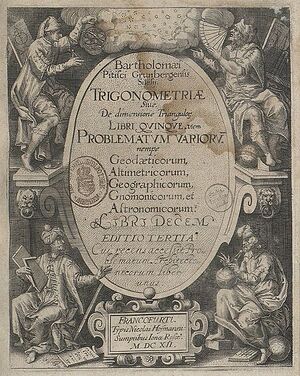Bartholomaeus Pitiscus (nonfiction): Difference between revisions
No edit summary |
No edit summary |
||
| (One intermediate revision by the same user not shown) | |||
| Line 1: | Line 1: | ||
[[File:Trigonometriae - Bartholomaeus Pitiscus.jpg|thumb|Front cover of ''Trigonometriae''.]]'''Bartholomaeus Pitiscus''' (also Barthélemy, Bartholomeo, August 24, 1561 – July 2, 1613) was a 16th-century German | [[File:Trigonometriae - Bartholomaeus Pitiscus.jpg|thumb|Front cover of ''Trigonometriae''.]]'''Bartholomaeus Pitiscus''' (also Barthélemy, Bartholomeo, August 24, 1561 – July 2, 1613) was a 16th-century German [[Mathematician (nonfiction)|mathematician]], astronomer and theologian who coined the word ''trigonometry''. | ||
== Biography == | == Biography == | ||
| Line 5: | Line 5: | ||
Pitiscus was born to poor parents in Grünberg (Zielona Góra) in Lower Silesia, nowadays in Poland, but then part of the Austrian-ruled Duchy of Glogau (Głogów). He studied theology in Zerbst and Heidelberg. A Calvinist, he was appointed to teach the ten-year-old Frederick IV, Elector Palatine of the Rhine, by Frederick's Calvinist uncle Johann Casimir of Simmern, as Frederick's father had died in 1583. Pitiscus was subsequently appointed court chaplain at Breslau (Wrocław) and court preacher to Frederick. Pitiscus supported Frederick's subsequent measures against the Roman Catholic Church. | Pitiscus was born to poor parents in Grünberg (Zielona Góra) in Lower Silesia, nowadays in Poland, but then part of the Austrian-ruled Duchy of Glogau (Głogów). He studied theology in Zerbst and Heidelberg. A Calvinist, he was appointed to teach the ten-year-old Frederick IV, Elector Palatine of the Rhine, by Frederick's Calvinist uncle Johann Casimir of Simmern, as Frederick's father had died in 1583. Pitiscus was subsequently appointed court chaplain at Breslau (Wrocław) and court preacher to Frederick. Pitiscus supported Frederick's subsequent measures against the Roman Catholic Church. | ||
Pitiscus achieved fame with his influential work written in Latin, called ''Trigonometria: sive de solutione triangulorum tractatus brevis et perspicuus'' (1595, first edition printed in Heidelberg), which introduced the word trigonometry to the English and French languages, translations into which had appeared in 1614 and 1619, respectively. It consists of five books on plane and spherical trigonometry. Pitiscus is sometimes credited with inventing the decimal point, the symbol separating integers from decimal fractions, which appears in his trigonometrical tables and was subsequently accepted by John Napier in his logarithmic papers (1614 and 1619). | Pitiscus achieved fame with his influential work written in Latin, called ''Trigonometria: sive de solutione triangulorum tractatus brevis et perspicuus'' (1595, first edition printed in Heidelberg), which introduced the word trigonometry to the English and French languages, translations into which had appeared in 1614 and 1619, respectively. It consists of five books on plane and spherical trigonometry. Pitiscus is sometimes credited with inventing the decimal point, the symbol separating integers from decimal fractions, which appears in his trigonometrical tables and was subsequently accepted by [[John Napier]] in his logarithmic papers (1614 and 1619). | ||
Pitiscus edited ''Thesaurus mathematicus'' (1613) in which he improved the trigonometric tables of Georg Joachim Rheticus and also corrected Rheticus’s ''Magnus Canon doctrinæ triangulorum''. | Pitiscus edited ''[[Canon Sinuum (Pitiscus) (nonfiction)|Thesaurus mathematicus]]'' (1613) in which he improved the trigonometric tables of [[Georg Joachim Rheticus (nonfiction)|Georg Joachim Rheticus]] and also corrected Rheticus’s ''Magnus Canon doctrinæ triangulorum''. | ||
Pitiscus died in Heidelberg. The lunar crater Pitiscus is named after him. | Pitiscus died in Heidelberg. The lunar crater Pitiscus is named after him. | ||
Latest revision as of 03:40, 25 August 2020
Bartholomaeus Pitiscus (also Barthélemy, Bartholomeo, August 24, 1561 – July 2, 1613) was a 16th-century German mathematician, astronomer and theologian who coined the word trigonometry.
Biography
Pitiscus was born to poor parents in Grünberg (Zielona Góra) in Lower Silesia, nowadays in Poland, but then part of the Austrian-ruled Duchy of Glogau (Głogów). He studied theology in Zerbst and Heidelberg. A Calvinist, he was appointed to teach the ten-year-old Frederick IV, Elector Palatine of the Rhine, by Frederick's Calvinist uncle Johann Casimir of Simmern, as Frederick's father had died in 1583. Pitiscus was subsequently appointed court chaplain at Breslau (Wrocław) and court preacher to Frederick. Pitiscus supported Frederick's subsequent measures against the Roman Catholic Church.
Pitiscus achieved fame with his influential work written in Latin, called Trigonometria: sive de solutione triangulorum tractatus brevis et perspicuus (1595, first edition printed in Heidelberg), which introduced the word trigonometry to the English and French languages, translations into which had appeared in 1614 and 1619, respectively. It consists of five books on plane and spherical trigonometry. Pitiscus is sometimes credited with inventing the decimal point, the symbol separating integers from decimal fractions, which appears in his trigonometrical tables and was subsequently accepted by John Napier in his logarithmic papers (1614 and 1619).
Pitiscus edited Thesaurus mathematicus (1613) in which he improved the trigonometric tables of Georg Joachim Rheticus and also corrected Rheticus’s Magnus Canon doctrinæ triangulorum.
Pitiscus died in Heidelberg. The lunar crater Pitiscus is named after him.
The classical scholar Samuel Pitiscus (1637-1727) was his nephew.
Literature
- Groundbreaking Scientific Experiments, Inventions, and Discoveries
- http://locomat.loria.fr contains a reconstruction of Pitiscus' tables.
S. Gottwald, H.-J. Ilgauds, K.-H. Schlote (Hrsg.): Lexikon bedeutender Mathematiker. Verlag Harri Thun, Frankfurt a. M. 1990 ISBN 3-8171-1164-9
External links
- Bartholomaeus Pitiscus @ Wikipedia
- O'Connor, John J.; Robertson, Edmund F., "Bartholomaeus Pitiscus", MacTutor History of Mathematics archive, University of St Andrews.
- Allgemeine Deutsche Biographie de:s:ADB:Pitiscus, Bartholomaeus
In the News
Fiction cross-reference
Nonfiction cross-reference
External links
- Bartholomaeus Pitiscus @ Wikipedia

